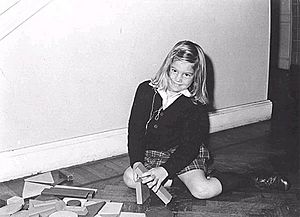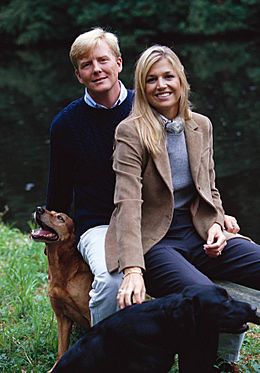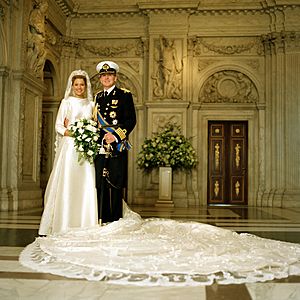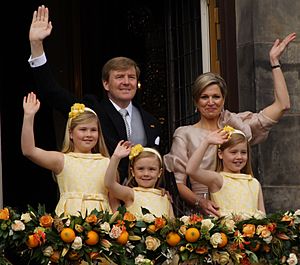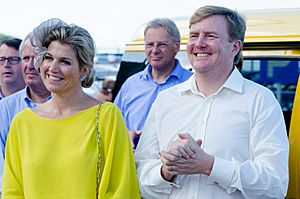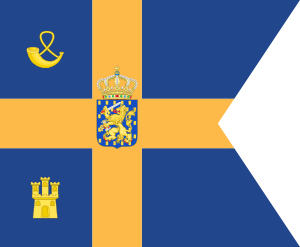Queen Máxima of the Netherlands facts for kids
Quick facts for kids Máxima |
|
|---|---|
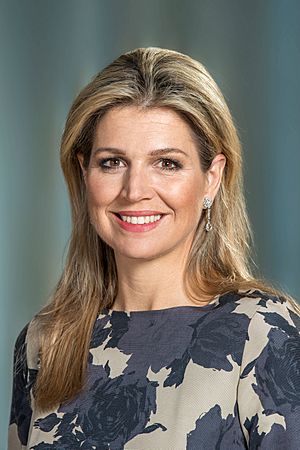
Formal portrait, 2015
|
|
| Queen consort of the Netherlands | |
| Tenure | 30 April 2013 – present |
| Born | Máxima Zorreguieta 17 May 1971 Buenos Aires, Argentina |
| Spouse | |
| Issue | |
| Father | Jorge Zorreguieta |
| Mother | María del Carmen Cerruti |
| Religion | Roman Catholicism |
Máxima (born Máxima Zorreguieta on 17 May 1971) is the Queen of the Netherlands. She is married to King Willem-Alexander.
Máxima was born in Argentina and worked in finance. She met Willem-Alexander, who was the eldest son of Queen Beatrix and the future king, in 1999. They got married in 2002. On 30 April 2013, Willem-Alexander became king after his mother stepped down, and Máxima became queen.
Queen Máxima works to help immigrants feel included in society. She also supports LGBTQ rights and helps people learn about managing their money. She and King Willem-Alexander have three daughters: Princesses Catharina-Amalia, Alexia, and Ariane. They are first, second, and third in line to the Dutch throne.
Contents
Early Life and Education
Máxima Zorreguieta was born in Buenos Aires, Argentina, on 17 May 1971. Her father was Jorge Zorreguieta (1928–2017), and her mother is María del Carmen Cerruti (born 1944). Máxima was named after her great-grandmother. Her family has roots in Italy, Spain, and Portugal.
She grew up in Buenos Aires and went to Northlands School, which is a bilingual school. In 1995, she earned a degree in economics from the Pontifical Catholic University of Argentina. She later continued her studies in the United States.
Before becoming queen, Máxima worked in finance. She worked for different companies in Buenos Aires, New York City, and Brussels. She focused on sales and emerging markets.
Meeting Willem-Alexander
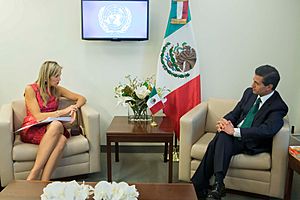
Máxima first met Willem-Alexander in April 1999 in Seville, Spain. He introduced himself as "Alexander" and she didn't know he was a prince. She thought he was joking when he later told her he was the Prince of Orange, who would one day be king. They met again in New York, where Máxima was working, and their relationship began.
News of their relationship and plans to marry caused some discussion in the Netherlands. This was because Máxima's father, Jorge Zorreguieta, had been a minister in Argentina's government during a difficult time in the country's history (1976–1983). A Dutch professor studied her father's role and found that he was likely aware of the problems happening at that time, even if he wasn't directly involved in bad actions.
Despite this, Máxima's popularity grew after she became queen. She is now the most popular member of the Dutch royal family. A TV series about her early life and meeting Willem-Alexander started airing in the Netherlands in 2024.
Marriage and Family
The couple announced their engagement on 30 March 2001. Máxima spoke to the nation in Dutch, even though she was still learning the language. She became a Dutch citizen on 17 May 2001, so she now has dual citizenship (Argentine and Dutch). The Dutch parliament approved their engagement, which was important for Willem-Alexander to remain in line to the throne.
Máxima and Willem-Alexander were married on 2 February 2002. The civil ceremony took place in the Beurs van Berlage in Amsterdam, followed by a religious ceremony at Amsterdam's Nieuwe Kerk. Máxima's parents did not attend the wedding. Her father was asked not to come because of his past role in the Argentine government, and her mother chose not to attend without him.
Máxima and Willem-Alexander have three daughters:
- Catharina-Amalia, Princess of Orange (born 7 December 2003)
- Princess Alexia of the Netherlands (born 26 June 2005)
- Princess Ariane of the Netherlands (born 10 April 2007)
Queen Máxima's Work
Queen Máxima cares a lot about helping immigrants become part of Dutch society. She believes it's very important for immigrants to learn the Dutch language, just as she did. Dutch is her third language; she also speaks Spanish (her first language) and English fluently, and some French.
In 2007, Máxima gave a speech where she said she hadn't found "the" Dutch identity. She explained that the Netherlands is very diverse and can't be described by just one idea. She said:
... but 'the' Dutch identity? No, I have not found it. The Netherlands is: large windows without curtains so everyone can look in; but also adherence to privacy and coziness. The Netherlands is: one biscuit at tea; but also great hospitality and warmth. The Netherlands is: sobriety, control and pragmatism; but also the experience of intense emotions together. The Netherlands is far too diverse to summarize in one cliché. 'The' Dutchman does not exist. As a consolation I can tell you that 'the' Argentine also does not exist. I therefore find it very interesting that the title of the report of the Scientific Council for Government Policy is not 'the Dutch identity'. But: Identification with the Netherlands. That leaves room for development and diversity.
She often attends conferences around the world to represent the Netherlands. She is also part of the Dutch Council of State, which is a very important advisory body and court in the Netherlands.
Queen Máxima has been the honorary chair of the Money Wise Platform since 2010. She helps teach people, especially children and young people, about managing money wisely. She also works to help small businesses get loans and support, and encourages more women to become entrepreneurs.
Since March 2022, Queen Máxima has been the Honorary President of "MIND Us." This is a mental health platform created with the MIND Foundation.
Working for the United Nations
Queen Máxima is a special advocate for the United Nations Secretary-General. Her role is to promote "Inclusive Finance for Development" (UNSGSA). She was given this role in September 2009 by the UN Secretary-General Ban Ki-moon. Her goal is to show how having access to financial services like savings accounts, insurance, and credit can help people avoid poverty.
She works to make sure that more people, especially those who are poor, can use financial services. This helps them protect themselves from things like high food prices or unexpected healthcare costs. She also promotes digital financial services, financial health, and responsible use of technology to help achieve global development goals.
Queen Máxima has visited many countries for the United Nations. She is also an honorary patron of the G20 Global Partnership for Financial Inclusion (GPFI). In this role, she works with governments to improve financial inclusion around the world.
Global Finance & Technology Network
In July 2025, Queen Máxima was appointed as the Chair of the International Advisory Board of the Global Finance & Technology Network (GFTN).
Titles and Honours
On 25 January 2002, when she married, Máxima Zorreguieta was given the titles Princess of the Netherlands and Princess of Orange-Nassau. She also became "Mrs. van Amsberg."
On 13 May 2011, the Dutch parliament confirmed that Máxima would become the queen consort of the Netherlands when her husband became king. On 28 January 2013, Queen Beatrix announced she would step down on 30 April. Máxima became queen on that day. She is the first Dutch queen to have been born as a commoner (not into a royal family) and the first to be born outside Europe.
Royal Titles
- 2 February 2002 – 30 April 2013: Her Royal Highness Princess Máxima of the Netherlands, Princess of Orange-Nassau, Mrs. van Amsberg
- 30 April 2013 – present: Her Majesty The Queen or Her Majesty Queen Máxima
Her full title is: Her Majesty Queen Máxima, Princess of the Netherlands, Princess of Orange-Nassau.
Honours
Queen Máxima has received many honours from the Netherlands and other countries. These honours are special awards given to important people.
From the Netherlands
- Knight Grand Cross of the Order of the Netherlands Lion (2 February 2002)
- Recipient of the Wedding Medal of Prince Willem-Alexander, Prince of Orange and Máxima Zorreguieta
- King Willem-Alexander Investiture Medal (30 April 2013)
- Grand Cross of the Order of the House of Orange (6 May 2021)
From Other Countries
She has received high honours from many countries, including Austria, Belgium, Brazil, Brunei, Chile, Denmark, Estonia, France, Germany, Greece, Italy, Japan, Jordan, Latvia, Lithuania, Luxembourg, Mexico, Norway, Oman, Poland, Portugal, Slovakia, South Korea, Spain, Sweden, and the United Arab Emirates.
Arms
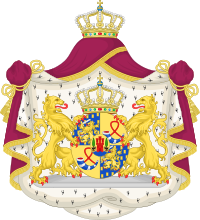 |
|
See also
 In Spanish: Máxima de los Países Bajos para niños
In Spanish: Máxima de los Países Bajos para niños
 | Aurelia Browder |
 | Nannie Helen Burroughs |
 | Michelle Alexander |


